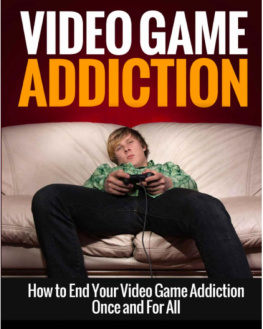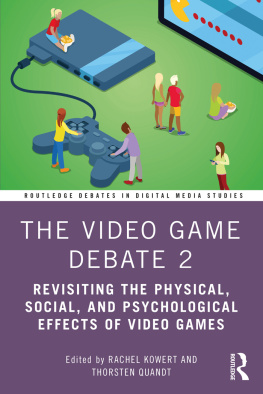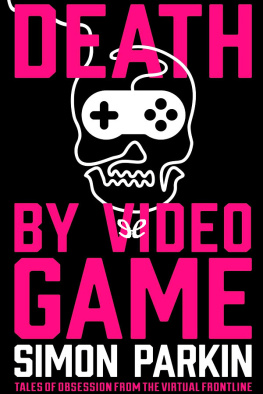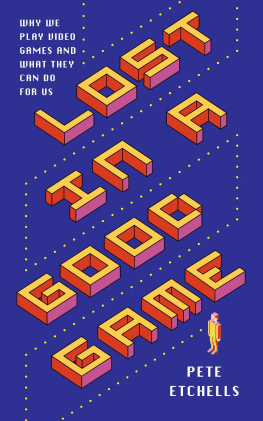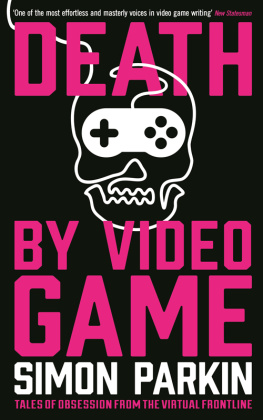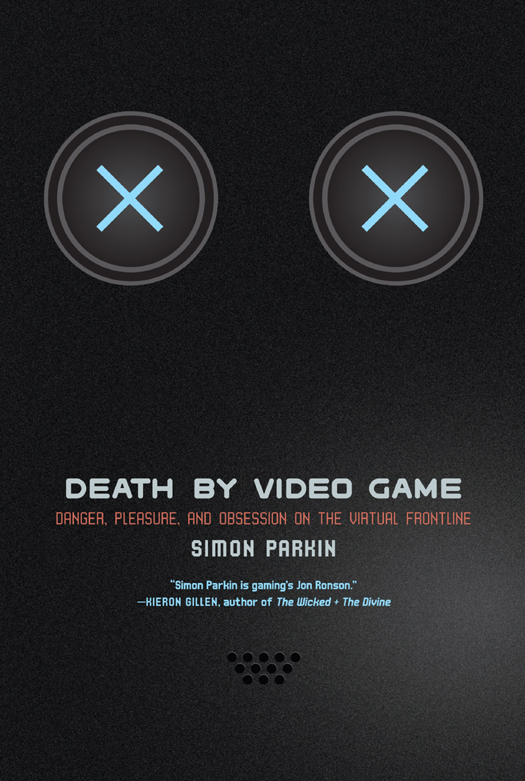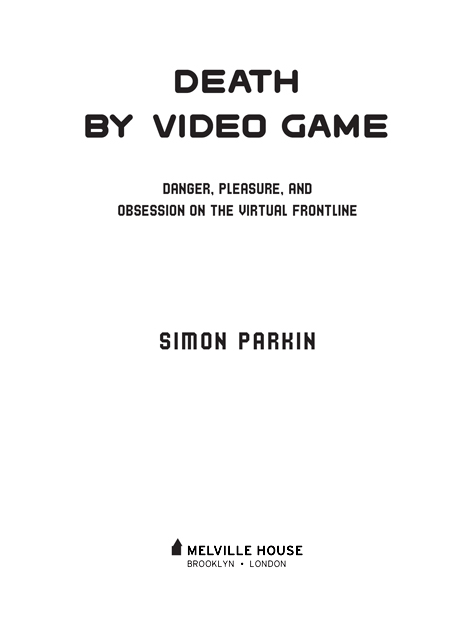DEATH BY VIDEO GAME
Copyright 2015 by Simon Parkin
Originally published by Serpents Tail, an imprint of Profile Books Ltd, in the United Kingdom, August 2015
First Melville House Printing: June 2016
Melville House Publishing
46 John Street
Brooklyn, NY 11201
and
8 Blackstock Mews
Islington
London N4 2BT
mhpbooks.com facebook.com/mhpbooks @melvillehouse
Ebook ISBN: 978-1-61219-541-4
Design by Marina Drukman
v3.1
To Christian Donlan, vital companion
through worlds real and imagined
What if we had a chance to do it again and again, until we finally did get it right? Wouldnt that be wonderful?
KATE ATKINSON , Life After Life
Youve been playing for a while. Why not take a break?
NINTENDO
CONTENTS
INTRODUCTION
January 2012: A young man is dead and if a video game wasnt the culprit, then it was, at very least, an accessory to the crime.
This isnt the first time that a video game is a suspect in a young persons death. Thirty years earlier, almost to the month, eighteen-year-old Peter Burkowski walks into Friar Tucks Game Room in Calumet City, Illinois, posts a high score on the arcade game Berzerk and, moments later, collapses dead. Since then, fresh reports of death of a video gamer (as Burkowskis story was reported at the time) have been a regular fixture in the news.
With each new story the video-game mediums reputation sinks lower. No longer is the popular charge merely that video games are a tremendous waste of time (a message thats been sustained for more than three decades, since games first emigrated from the bellies of esteemed American universities and into the local bars as Pong and Space Invaders cabinets); now they are killers too. And in our mortal reality, unlike that of the benevolent video game with its interminable supply of lives, there are no second chances.
The video game makes for an obvious suspect in these cautionary tales. Look at the player, sat there on the fat couch, motionless apart from the steady twitch of the hands, the unblinking eyes, the occasional grimace. This is not the lung-expanding, cheek-colouring variety of play we find on the playground or football field. Its not obviously wholesome. No, this appears to be an especially impoverished, depraved form of play, onanistic or, perhaps worse still, infantile, as the controllers umbilical-like cord twirls and stretches between the human and the television screen.
If nothing else, as the youngest form of art and entertainment, games are, accordingly, the least trusted. This is their inevitable lot.
Every new medium encounters similar resistance, a fear (usually generational) of change and its attendant loss, often capitalised on by the media of the time as a subject for easy sensationalism. For example, on August 26, 1858, the San Antonio Texan printed the following cautionary (although presumably fictional, or at least exaggerated) tale about the dangers of overindulging in novel-reading.
A whole family brought to destitution in England, has had all its misfortunes clearly traced by the authorities to an ungovernable passion for novel reading entertained by the wife and mother. The husband was sober and industrious, but his wife was indolent and addicted to reading everything procurable in the way of romance. This led her to utterly neglect her husband, herself and her eight children. One daughter in despair, fled the parental home, and threw herself into the haunts of vice. Another was found by the police chained by the legs to prevent her from following her sisters example. The house exhibited the most offensive appearance of filth and indigence. In the midst of this pollution, privation and poverty, the cause of it sat reading the last sensation work of the season, and refused to allow herself to be disturbed in her entertainment.
Indolence, addiction, neglect, vice, filth, pollution and poverty: each noun a gavel strike aimed at the unassuming romance novel.
The excerpt is echoed, if not in tone then in purpose, by contemporary newspaper articles decrying the perils of video-game addiction. Stories of video games nefarious effects have followed the medium since its inception. In Martin Amiss nonfiction book Invasion of the Space Invaders we read of Anthony Hill, one of the more spectacular casualties of the bleeping sickness. (Even Amis, a staunch video-game advocate at the time, employs the language of injury and disease when discussing the video games effect on the heart and mind.) Hill was, according to Amis, an unemployed seventeen-year-old who sold sexual favours to a seventy-four-year-old pastor in exchange for money in order to fund a Space Invaders habit.
This was not an isolated report. In the 1980s, the mediums apparent absence of virtue was debated in the English Parliament (where Hills case was mentioned, although the boys identity was not). On May 20, 1981, the Labour MP George Foulkes (now a baron in the House of Lords) proposed a bill for the Control of Space Invaders and Other Electronic Games in the House of Commons. The bill would have meant that arcade and bar owners would require licences or even planning permission in order to install arcade machines for their customers. At the bills proposal, Foulkes said:
I have seen reports from all over the country of young people becoming so addicted to these machines that they resort to theft, blackmail and vice to obtain money to satisfy their addiction. I use the word addiction not in its increasingly common misuse, as being generally fond of something, but in its strictly correct sense of being so attracted to an activity that all normal activity is suspended to carry it out.
If other honourable members didnt believe Foulkess observations, he proposed that they go incognito to an arcade or caf in their own areas and see the effect that it is having on young people. There they would find, he claimed, young people crazed, with eyes glazed, oblivious to everything around them. He then described the profits arcade machines made as blood money extracted from the weakness of thousands of children.
The following year, on November 9, 1982, U.S. Surgeon General Dr. Everett Koop gave a speech at the Western Psychiatric Institute and Clinic in Pittsburgh, in which he challenged America to confront the causes of domestic violence and child abuse. After the speech, he took a question from an audience member asking whether he thought video games had a negative effect on young people.
Yes, he replied. Teenagers were becoming addicted body and soul to video games, a form of entertainment in which theres nothing constructive.
While Foulkess bill did not pass (although it came preposterously close) and Dr. Koop retracted his comments the day after his speech, the image of the glazed addict has persisted, even as video games have become increasingly widespread and accepted in many cultures. Indeed, the sustained level of popular distrust received by video games is one that their forebears in music, cinema, theatre, and even print seemed to pull away from more quickly. Across the decades, video games have been blamed for a multitude of crimes, from inspiring dangerous driving to being used as training devices for murderers in school shootings. Today, the president of the United States carries a laptop bearing a


